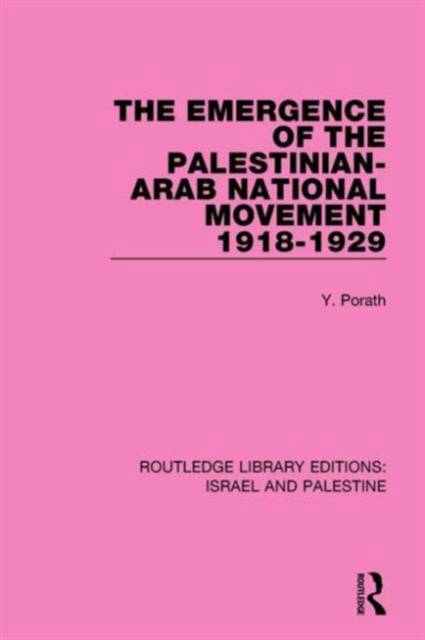
- Retrait gratuit dans votre magasin Club
- 7.000.000 titres dans notre catalogue
- Payer en toute sécurité
- Toujours un magasin près de chez vous
- Retrait gratuit dans votre magasin Club
- 7.000.0000 titres dans notre catalogue
- Payer en toute sécurité
- Toujours un magasin près de chez vous
The Emergence of the Palestinian-Arab National Movement, 1918-1929
Yehoshua PorathDescription
The resurgence of Palestinian nationalism in the wake of the 1967 Arab-Israeli war tended to overshadow the fact that Palestinian national consciousness is not a new phenomenon, but traces its origins back to the time when the first stirrings of nationalism were being felt in many parts of the under-developed world. This work, first published in 1974, is based on both Arabic and Hebrew primary sources as well as English and French official and unofficial documents, and was the first detailed study of the infancy period of Palestinian nationalism. The book begins by establishing the position of Palestine and Jerusalem in Islamic history and their significance within the concepts of Islam, and outlines the social and political features of the Palestinian population at the beginning of the First World War. The author then charts in detail the development of Palestinian nationalism over the decade after the War. Two major forces influenced this development and reacted with it: Zionism, with its ambitious schemes for settling Jews in Palestine and creating a National Home for them there, and Arab nationalism on a wider scale, which was emerging spontaneously with the disintegration of the Ottoman Empire and the spreading of ideas of self-determination. The growing threat posed by Zionism awoke the Palestinian population to the need for organization and the establishment of their own identity to oppose it, while the focus of their national aspirations widened or narrowed according to the ability which they felt at any given time to confront Zionism and achieve self-expression within a Palestinian rather than an all-Syrian national framework. The events of these turbulent years - the confrontations with the British, delegations, boycotts, proposals and rejections, the emergence of al-Hajj Amin al-Husayni, the Wailing Wall conflict and its repercussions - are all described within the context of these wider considerations, which also include Britain's own role as holder of the Mandate over Palestine.
Spécifications
Parties prenantes
- Auteur(s) :
- Editeur:
Contenu
- Nombre de pages :
- 418
- Langue:
- Anglais
Caractéristiques
- EAN:
- 9781138904163
- Date de parution :
- 18-05-15
- Format:
- Livre relié
- Format numérique:
- Genaaid
- Dimensions :
- 156 mm x 233 mm
- Poids :
- 724 g

Les avis
Nous publions uniquement les avis qui respectent les conditions requises. Consultez nos conditions pour les avis.






